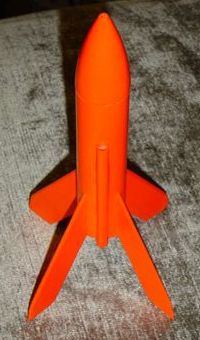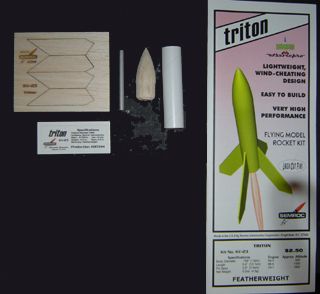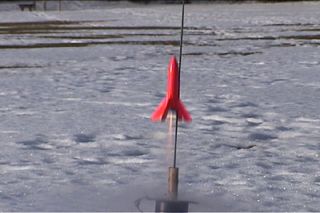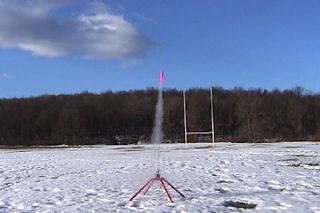| Construction Rating: | starstarstarstarstar |
| Flight Rating: | starstarstarstarstar_border |
| Overall Rating: | starstarstarstarstar_border |
| Diameter: | 0.76 inches |
| Manufacturer: | Semroc  |
| Style: | Sport |

Brief:
This is a very basic high performance 4 fin and nose cone model that is part of
the RetroRepro series by Semroc. It was designed in 1968 and was the first
released Semroc kit. Here it has been updated with laser cut fins and an
improved launch lug.
Construction:
The kit comes with 1 body tube, 1 balsa nose cone, 1 launch lug, 1 sheet of
four laser cut fins, 1 specs decal, and instruction booklet. The fin sheet is
safely tucked inside the instruction booklet.
The instructions and construction of this model are straightforward and simple. It is easy to build and the instructions provide a fin guide to make your first marks. The laser cut fins are very good quality and an appropriate thickness. The 11 construction steps are in a logical order and clear illustrations should help out a first time builder. There really are no gotchas and no special tools are needed because this kit is as basic as it gets.
Finishing:
The instructions also provide a real nice description and illustrations on
finishing which will be helpful to first timers. After several sealing and
sanding coats my Triton was primed and then spray painted day glow orange for
tracking and recovery ease in Winter flights.

Construction Rating: 5 out of 5
Flight:
The recommended motors were A8-5 for an approximate altitude of 600', B6-6 for
1000', and C6-7 for 1600'. I didn't have any A8-5s and I had no intention of
launching on anything more powerful than an A so I could complete 3 flights
with recovery for purposes of this review. Featherweight recovery required no
wadding but a wrap of masking tape around the motor base was necessary to keep
the motor snug in the body tube. First flight was on a 1/2A6-2. Very straight
to about 300 feet. Short delay and nice sharp ejection pop while Triton was
coasting upward. Motor landed about 10ft from pad and Triton planted nose first
about 30ft from the pad. Next launch on an A8-3 and went to about 500ft. Due to
the short delay, it ejected as Triton was still coasting upward. For the third
launch I sleeved a 1/2A3-4T in a used 18mm casing. This propelled the Triton to
about 200-250 feet and provided a more appropriate delay so that it was
horizontal at ejection. All flights were straight up though a minor spin (less
than 1 rotation) was witnessed in the lower powered flights. 5 mph gusts of
wind may have been the culprit here but there wasn't any signs of windcocking
in the gusts.

Recovery:
Once separated from its engine, the Triton falls really fast. Mine also had a
nice spin on the way down. As the balsa nose hit the defrosting ground three
times it sustained a little damage. It was nothing that can't be sealed and
repainted. I also want to point out that the damage did not seem to impact
subsequent flight performance. It probably would be fine nosing in to a
non-frozen field or better yet some soft grass. I wouldn't want to wreck the
retro feel of the Triton kit by changing out the balsa nose for a plastic one
with some added weight, but it's food for thought.
Flight Rating: 4 out of 5

Summary:
There really is no downside to this rocket. The packaging brings you back to
the early days of the hobby. It takes about 10 minutes to build and of course
longer to finish depending on how you want it to look. The retail list price is
$2.50 and online vendors let em fly for significant savings. You really can't
go wrong with this kit. The Triton would be an ideal first rocket or a carton
of them would be great for a scout or group build. Featherweight recovery means
no wadding is required so it's a great cost per flight bargain and prep time is
minimal. As previously stated, a plastic nosecone could be considered for
durability but I feel would detract from the retro feel of this kit.
Overall Rating: 4 out of 5
 |
 |
Flights
 |
 |
B.A. (March 21, 2006)
Sponsored Ads
 |
 |












D.B. (February 28, 2006)